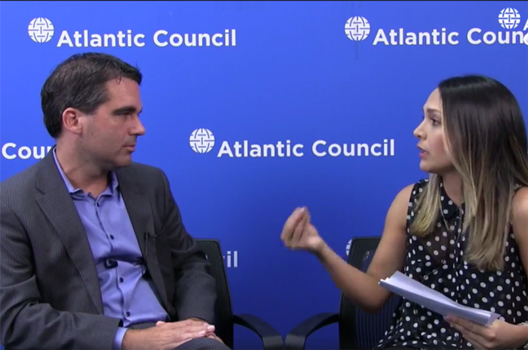 While US sanctions on Venezuelan President Nicolás Maduro present a smart, targeted response, a coordinated international approach is necessary to address the political and humanitarian crises in Venezuela, according to two Atlantic Council analysts.
While US sanctions on Venezuelan President Nicolás Maduro present a smart, targeted response, a coordinated international approach is necessary to address the political and humanitarian crises in Venezuela, according to two Atlantic Council analysts.
“The United States can’t go it alone,” said Jason Marczak, director of the Latin America Economic Growth Initiative in the Atlantic Council’s Adrienne Arsht Latin America Center. However, he added, “the international community, by and large, has not coalesced around this crisis.”
This constitutes a “failure” on the part of the international community, said Andrea Saldarriaga Jiménez, assistant director of the Adrienne Arsht Latin America Center.
US President Donald J. Trump’s administration imposed sanctions on Maduro on July 31 after the Venezuelan government held a referendum to elect a body to redraft the constitution. The referendum, described by US National Security Advisor H.R. McMaster as a “sham,” is seen as an attempt by Maduro to consolidate power. As a consequence of the sanctions, any assets Maduro may have under US jurisdiction have been frozen and US citizens are barred from doing business with him.
Marczak and Saldarriaga Jiménez participated in a Facebook Live discussion on July 31 on the implications of the referendum.
The referendum, held on July 30, followed months of political repression, food shortages, and riots that have left nearly 120 civilians dead. The next day, two prominent Venezuelan opposition leaders—Leopoldo López and Antonio Ledezma—were arrested in midnight raids on their homes.
The referendum marks a turning point at which Maduro’s dangerous disregard for democratic principles can no longer be ignored by the international community, said Marczak.
Saldarriaga Jiménez noted that “one of the immediate effects that we have seen is a spike in violence… we have seen 120 deaths since protests started [in April], but just only yesterday we saw nearly ten deaths.”
According to Marczak, while the crisis in Venezuela is perceived as a purely regional issue, that is not the case. He warned that the dire humanitarian situation in Venezuela will have an impact on neighboring countries. “A mass exodus of Venezuelans [is likely], because they just can’t survive on a day-to-day basis,” he said.
According to Saldarriaga Jiménez, that mass exodus has already begun, with 25,000 Venezuelans crossing the border to Colombia every day. She reinforced the need for the international community to remain engaged in Venezuela and to craft responses that would pressure the Maduro government, while ensuring that more economic harm does not befall Venezuelans as a result.
“Unilateral sanctions rarely work,” said Marczak. However, both Marczak and Saldarriaga Jiménez agreed that the targeted sanctions imposed by the United States against Maduro and other high-ranking Venezuelan officials who are close to the government are the right move. According to Marczak, in order to ensure their effectiveness, they must be backed by the rest of the international community. This would put pressure on the Maduro government and show the Venezuelan military that “their days are numbered if they support the abuses that are being carried out from the government,” said Marczak.
Kelly Russo is a communications intern at the Atlantic Council.
Image: Jason Marczak, director of the Latin America Economic Growth Initiative in the Atlantic Council’s Adrienne Arsht Latin America Center, joined Andrea Saldarriaga Jiménez, assistant director of the Adrienne Arsht Latin America Center, for a Facebook Live discussion on the crisis in Venezuela.
